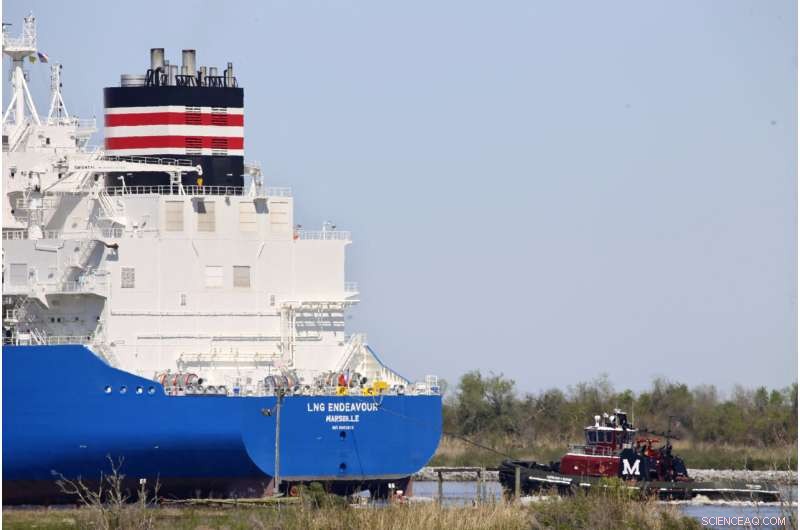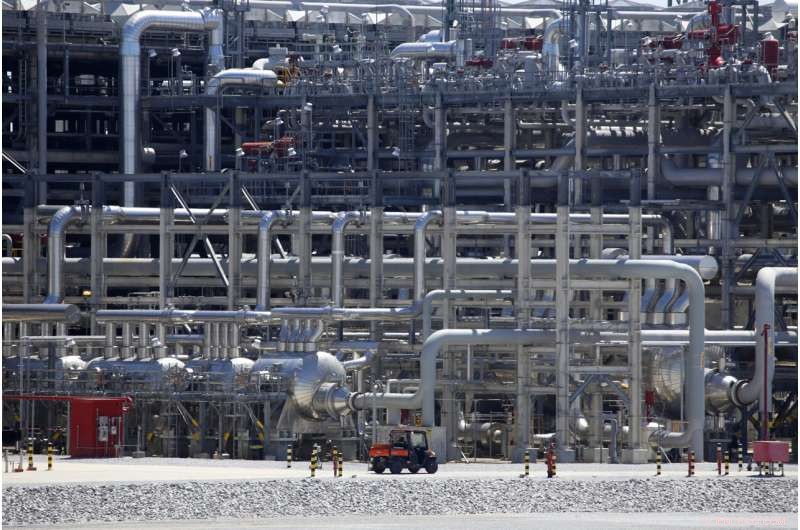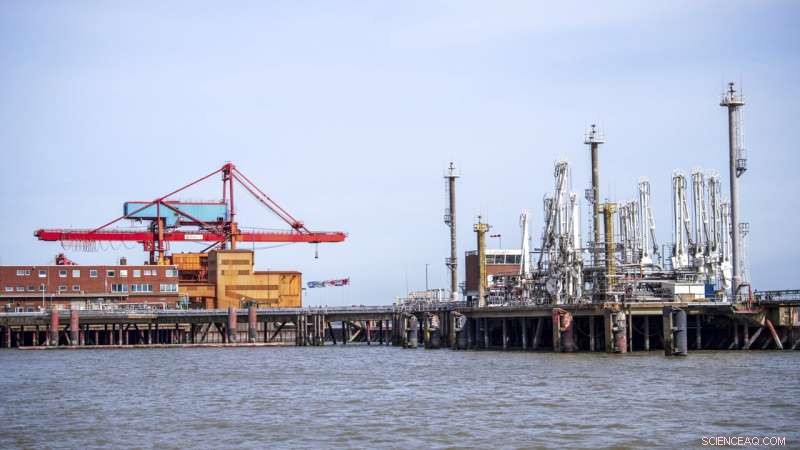
En bogserbåt hjälper till att guida ett franskt fartyg, känt som LNG Endeavour, genom Calcasieu Lake nära Hackberry, La., den 31 mars 2022. Rysslands krig mot Ukraina krossade dess förbindelser med Europa, som snart förlorade det mesta av den naturgas som Moskva hade länge förutsatt. Nu när vintern närmar sig har europeiska länder stöttat en kortsiktig fix som ska börja före slutet av 2022 som har väckt larm bland forskare som fruktar de långsiktiga konsekvenserna för klimatet. Kredit:AP Photo/Martha Irvine, Arkiv
När vintern närmar sig har europeiska nationer, som är desperata efter att ersätta den naturgas som de en gång köpte från Ryssland, anammat en kortsiktig lösning:En serie med cirka 20 flytande terminaler som skulle ta emot flytande naturgas från andra länder och omvandla den till uppvärmningsbränsle.
Ändå har planen, med de första flytande terminalerna inställda på att leverera naturgas vid årets slut, väckt larm bland forskare som fruktar de långsiktiga konsekvenserna för miljön. De varnar för att dessa terminaler skulle vidmakthålla Europas beroende av naturgas, som frigör klimatvärmande metan och koldioxid när den produceras, transporteras och förbränns.
Vissa forskare säger att de oroar sig för att de flytande terminalerna kommer att bli en långsiktig leverantör av Europas enorma energibehov som kan pågå i år, om inte årtionden. En sådan trend kan sätta tillbaka ansträngningar för att minska utsläppen som experter säger inte har gått tillräckligt snabbt för att bromsa skadorna på den globala miljön.
Mycket av den flytande naturgas, eller LNG, som Europa hoppas få, förväntas komma från USA. Behovet uppstod efter att Rysslands invasion av Ukraina krossade dess band med Europa och ledde till att det mesta av den naturgas som Moskva länge hade tillhandahållit avbröts. Längs den amerikanska gulfkusten expanderar exportterminalerna och många invånare där är oroade över ökningen av borrningar efter gas och den resulterande förlusten av mark samt extrema väderförändringar i samband med förbränning av fossila bränslen.
"Att bygga denna enorma LNG-infrastruktur kommer att låsa världen till fortsatt beroende av fossila bränslen och fortsatta klimatskador i decennier framöver", säger John Sterman, klimatforskare vid Massachusetts Institute of Technology.
Naturgas bidrar avsevärt till klimatförändringen – både när den förbränns, blir till koldioxid och genom läckage av metan, en ännu mer potent växthusgas. Ändå har europeiska nationer, som i åratal varit ledande när det gäller att gå över till renare energi, föreslagit att ta med mer än 20 flytande LNG-terminaler till sina hamnar för att kompensera för förlusten av Rysslands naturgas.
Terminalerna, som reser sig över bostäder och sträcker sig nästan 1 000 fot (304 meter), kan lagra ungefär 6 miljarder kubikfot (170 000 kubikmeter) LNG och omvandla den till gas för hem och företag. De kan byggas snabbare och billigare än landbaserade importterminaler, även om de är dyrare att driva, enligt International Gas Union.
"Every country needs to prepare for a scenario where there may be a cut in Russian supplies," said Nikoline Bromander, an analyst with Rystad Energy. "If you are dependent, you need to have a backup plan."

A flare burns at Venture Global LNG in Cameron, La., on April 21, 2022. Russia’s war against Ukraine shattered its relations with Europe, which soon lost most of the natural gas that Moscow had long provided. Now, as winter nears, European nations have backed a short-term fix set to begin before the end of 2022 that has raised alarms among scientists who fear the long term consequences for the climate.Credit:AP Photo/Martha Irvine, File
Many environmental scientists argue that the money being earmarked for the ships—which cost about $500 million each to build, according to Rystad—would be better spent on rapidly adopting clean-energy or efficiency upgrades that could reduce energy consumption.
Constructing more solar or wind farms, which takes years, wouldn't immediately replace Russian gas. But with adequate funding, Sterman suggested, greater energy efficiencies—in homes, buildings and factories, along with the deployment of wind, solar and other technologies—could vastly reduce Europe's need to replace all the gas it's lost.
Germany, among Europe's strongest advocates for the floating LNG terminals, is expecting five of the ships and has committed roughly 3 billion euros to the effort, according to Global Energy Monitor. Germany has also approved a law to fast-track the terminals' development, suspending the requirement for environmental assessments.
It's a move that troubles environmental groups.
"It's totally obvious," asserted Sascha Müller-Kraenner, CEO of Environmental Action Germany, that "the provisions of the law were developed in close dialogue with the gas industry."
Germany's government and energy industry have defended their embrace of the LNG terminals as an urgent response to the loss of most of the Russian gas they had long received, which they fear Moscow will shut off completely.
"In an exceptional situation such as this, where it's a matter of Germany's gas supply security, it is justified to accelerate the approval process," Germany's energy industry association, BDEW, said in a statement.
Susanne Ungrad, a spokeswoman for Germany's Economy and Energy Ministry, noted that efforts are being made to lower methane emissions in exporting countries like the United States. And she said that in pursuing the construction of LNG terminals, Europe authorities will conduct comprehensive assessments.

A small vehicle drives past a network of piping that makes up pieces of a "train" at Cameron LNG export facility in Hackberry, La., on March 31, 2022. Russia’s war against Ukraine shattered its relations with Europe, which soon lost most of the natural gas that Moscow had long provided. Now, as winter nears, European nations have backed a short-term fix set to begin before the end of 2022 that has raised alarms among scientists who fear the long term consequences for the climate. Kredit:AP Photo/Martha Irvine, Arkiv
Greig Aitken, an analyst at Global Energy Monitor, noted that a terminal that's set to open near Gdansk, Poland, has signed contracts with American LNG suppliers that extend well past 2030. That could make it problematic for the European Union to meet its goal of reducing greenhouse gas emissions by at least 55% by 2030.
Italy, Greece, France, the Netherlands, Croatia, Estonia, Finland, Latvia, Slovenia and the U.K. all have one or more floating LNG terminals planned, according to Rystad Energy.
In some cases, proponents argue, the ships could aid the environmental cause. They note, for example, that as Russian gas supplies have dwindled, communities in Germany and elsewhere have been burning coal, which typically produces more emissions than natural gas. Increasing the supply of natural gas would make this less necessary.
Still, methane can frequently leak along the natural gas supply chain. So in some cases, the net climate effect of burning natural gas may be no better than coal.
The U.N. Intergovernmental Panel on Climate Change has warned that continuing to use the fossil fuel infrastructure already in place would cause global warming to exceed 1.5 degrees Celsius (2.7 Fahrenheit). At that level, heat would be expected to worsen the flash floods, extreme heat, intense hurricanes and longer-burning wildfires that have resulted from climate change and have cost lives.
"It is a little disheartening to see Europe, which has been the seat of so much energy and action and bold emissions targets, being home to this particular way with doubling down on fossil fuel infrastructure," said Kim Cobb, a climate scientist at Brown University.
In the United States, the largest export market for Europe-bound LNG, three new export terminals are under construction. Eleven additional terminals and four expansions are in the planning stages. Some export terminals that had struggled to attract financing are now seeing more investment and interest, said Ira Joseph, a longtime energy analyst.
"What you've seen happen over the last two months—they're signing up sales and purchase agreements, right and left," Joseph said.

The area in front of the Stade Industrial Park is part of the future port expansion for the planned import terminal for liquefied natural gas (LNG) in Stade, Germany, on April 2022. Russia’s war against Ukraine shattered its relations with Europe, which soon lost most of the natural gas that Moscow had long provided. Now, as winter nears, European nations have backed a short-term fix set to begin before the end of 2022 that has raised alarms among scientists who fear the long term consequences for the climate. Credit:Sina Schuldt/dpa via AP, File
Rio Grande LNG, an export terminal proposed by Next Decade in Brownsville, Texas, for example, appeared to stall last year in the face of environmental protests. But this spring, a French company, Engie, and several clients in Asia signed long-term contracts to buy LNG from the terminal. Now, Next Decade says it's likely to obtain all the financing it needs.
Europe's gas scarcity has escalated global LNG prices, leading buyers in China and elsewhere to sign long-term contracts with suppliers in the United States. American LNG exports will likely grow by 10 million tons over the next year, said Bromander, the Rystad analyst.
The floating LNG ships have been billed as a short-term solution to keep gas flowing for a few years while cleaner energy sources like wind and solar are built up. But critics say it's unlikely that a ship built to last decades would permanently halt operations after a few years.
Once the floating terminals are built, they can be used anywhere in the world. So if European nations no longer want floating LNG terminals as they transition to cleaner energy, the ships could sail off to another port, essentially locking in the use of natural gas for decades.
And in some cases, particularly in Germany, some of the proposed floating terminals appear to be paving the way for on-shore terminals that would be built to last 30 or 40 years—well past the point that nations should be burning fossil fuels, environmental groups say.
"After the war is resolved and, as we all hope, peace is restored, are they really going to say, 'Oh, let's take it to the scrap yard?,'" Sterman asked. "They're not going to do that." + Utforska vidare
© 2022 Associated Press. Alla rättigheter förbehållna. Detta material får inte publiceras, sändas, skrivas om eller omdistribueras utan tillstånd.